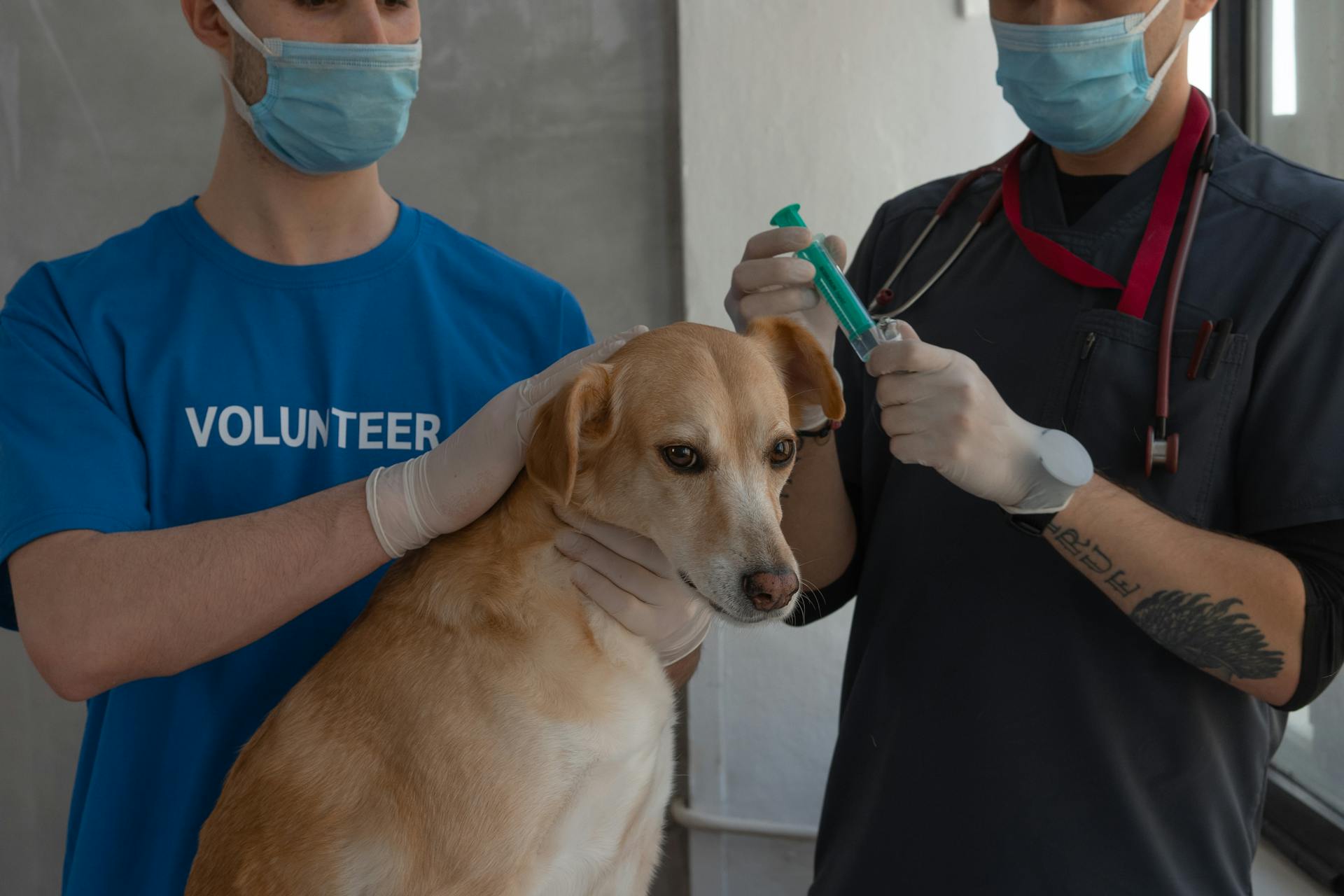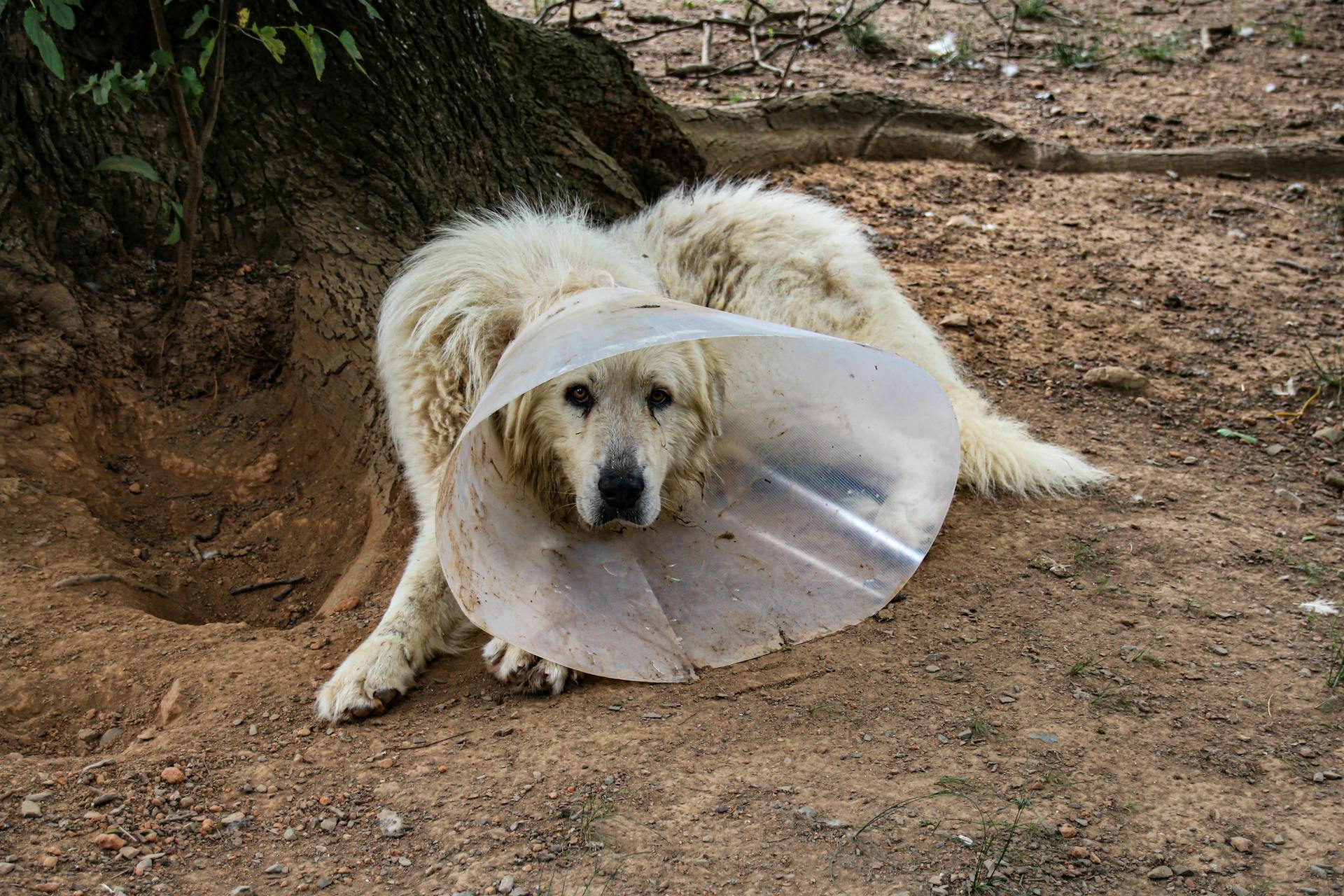
Pancreatitis in dogs is a serious condition that requires prompt attention. Pancreatitis is inflammation of the pancreas, a vital organ that produces digestive enzymes and hormones.
Symptoms of pancreatitis in dogs can vary, but common signs include vomiting, diarrhea, abdominal pain, and loss of appetite.
The pancreas is a vital organ that produces digestive enzymes and hormones, including insulin and glucagon. These enzymes and hormones play a crucial role in regulating blood sugar levels and facilitating digestion.
Dogs with pancreatitis may also exhibit lethargy, fever, and dehydration due to vomiting and diarrhea.
On a similar theme: What Food Gives Dogs Diarrhea
What Is Pancreatitis in Dogs?
Pancreatitis in dogs occurs when the pancreas is inflamed and swollen, caused by the early activation of a digestive enzyme within the pancreas due to pancreatic damage.
This damage causes the pancreas to digest itself, leading to the destruction of pancreatic tissue and damage to nearby organs. Acute pancreatitis can quickly lead to chronic systemic inflammation, shock, and even death.
There are two forms of pancreatitis: acute and chronic. Acute pancreatitis usually comes on suddenly, while chronic pancreatitis develops slowly over time.
Acute pancreatitis is more severe than chronic pancreatitis, and if left untreated, can be fatal. Chronic pancreatitis can cause permanent changes in the pancreatic tissue, leading to conditions like diabetes.
Here are the two forms of pancreatitis:
- Acute pancreatitis: sudden onset, severe symptoms, and potentially fatal if left untreated.
- Chronic pancreatitis: slow development, often without symptoms, but can lead to permanent changes in the pancreas and related conditions.
What Causes?
Pancreatitis in dogs can be a puzzling condition, and understanding its causes is crucial in preventing and managing it. The most common cause of pancreatitis in dogs is a high-fat diet or ingesting a fatty meal.
In fact, most cases of pancreatitis are idiopathic, meaning the exact cause is unknown. However, some breeds are more prone to developing pancreatitis due to genetic predisposition, such as Miniature Schnauzers, English Cocker Spaniels, and Miniature Poodles.
Dietary indiscretion is another common cause of pancreatitis, where dogs eat things they shouldn't, like garbage or human food. This can be especially problematic around holidays like Thanksgiving and Christmas, when fatty foods are more readily available.
Intriguing read: Can Too Much Water Cause Diarrhea in Dogs
Certain medications and toxins can also trigger pancreatitis in dogs, including vinca alkaloids, azathioprine, and salicylates. Additionally, underlying health problems like Cushing's disease, hypothyroidism, and diabetes mellitus can increase the risk of pancreatitis.
Here are some common causes of pancreatitis in dogs:
- High-fat diet or ingesting fatty foods
- Idiopathic (unknown cause)
- Dietary indiscretion (eating things they shouldn't)
- Genetic predisposition (certain breeds)
- Medications and toxins
- Underlying health problems
Being aware of these risk factors can help you prevent and manage pancreatitis in your furry friend. By keeping an eye on your dog's diet and health, you can reduce the likelihood of pancreatitis and ensure they lead a happy and healthy life.
Signs & Symptoms
Pancreatitis can be a serious condition in dogs, and it's essential to recognize the signs and symptoms to get them the help they need.
Acute pancreatitis presents with more severe symptoms, such as severe lethargy, abdominal pain, persistent vomiting, diarrhea, severe dehydration, and even collapse and shock in extreme cases.
Chronic pancreatitis, on the other hand, is typically not as sick, with clinical signs including lethargy, decreased appetite, weight loss, abdominal pain, and/or vomiting.
Common symptoms of pancreatitis in dogs include decreased or absent appetite, nausea and vomiting, abdominal pain, abdominal distention, abnormal poop or diarrhea, fever, lethargy or weakness, and dehydration.
Here are the key symptoms to look out for:
- Decreased or Absent Appetite
- Nausea and Vomiting
- Abdominal Pain
- Abdominal Distention
- Abnormal Poop or Diarrhea
- Fever
- Lethargy or Weakness
- Dehydration
It's crucial to note that acute pancreatitis typically presents suddenly with more severe symptoms, while chronic pancreatitis is ongoing and often accompanied by milder symptoms.
Diagnosis and Testing
Diagnosing pancreatitis in dogs can be challenging because the symptoms may not be specific or severe. Routine blood tests are often not helpful, but there are pancreatic-specific blood tests that can be performed when a veterinarian has a high suspicion of pancreatitis.
A thorough physical exam is important to rule out other health conditions with similar symptoms. Veterinarians will often begin treatment based on clinical signs alone, but diagnostic testing is still important to determine the best course of treatment.
Some common diagnostic tests that may be performed include ultrasound, bloodwork, and blood tests for pancreatic enzymes. Abdominal X-rays and ultrasound scans may be used to rule out other causes of vomiting or pain and assess the size of the pancreas and nearby organs.
Readers also liked: Do Dog Dna Tests Work
Here are some of the most common diagnostic tests used to diagnose pancreatitis in dogs:
- Ultrasound: This is the best diagnostic tool to determine if your pet has signs of pancreatitis.
- Bloodwork: This measures blood cells, blood sugar, electrolytes, and organ function parameters.
- Blood tests: Blood tests for pancreatic enzymes can help diagnose pancreatitis, including a specific test called canine pancreatic lipase immunoreactivity (cPLI).
- Radiographs and Ultrasound: These imaging tests may show inflammation or other changes in some dogs with pancreatitis.
- Surgery: Definitive diagnosis of pancreatitis requires a biopsy, obtained through surgery.
What's in It?
So, what's in a diagnosis of pancreatitis in dogs? A veterinarian will typically start by doing a thorough physical exam, and then recommend diagnostic testing to rule out other health conditions with similar symptoms.
One of the most common diagnostic tests is an ultrasound, which is often the best tool for determining if your dog has signs of pancreatitis.
Bloodwork is also important, measuring blood cells, blood sugar, electrolytes, and organ function parameters. However, bloodwork changes tend to be non-specific, meaning they can be associated with many different diseases.
A blood test for pancreatic enzymes, such as canine pancreatic lipase immunoreactivity (cPLI), can also help diagnose pancreatitis. But even these tests might not be accurate in all dogs, so a vet may need to begin treatment based on symptoms alone.
Radiographs and ultrasound imaging tests may show inflammation or other changes in some dogs with pancreatitis, and can also help rule out other conditions.
You might enjoy: Draw Blood

Here are some of the most common diagnostic tests for pancreatitis in dogs:
- Ultrasound: A common diagnostic tool for signs of pancreatitis
- Bloodwork: Measures blood cells, blood sugar, electrolytes, and organ function parameters
- Blood tests for pancreatic enzymes: Can help diagnose pancreatitis, but may not be accurate in all dogs
- Radiographs and Ultrasound: Imaging tests that can show inflammation or other changes in some dogs with pancreatitis
- Surgery: A definitive diagnosis of pancreatitis requires a biopsy, but is often impractical to perform in an ill patient
If left untreated, pancreatitis in dogs can become chronic and lead to weight loss and lethargy.
How Veterinarians Diagnose
Diagnosing pancreatitis in dogs can be challenging because the symptoms may not be specific or severe. Routine blood tests are often not helpful in diagnosing pancreatitis.
A veterinarian will examine your dog for signs of abdominal pain and dehydration. They may also perform a routine blood test, which can help diagnose pancreatitis by looking for increased levels of enzymes like amylase and lipase, indicating an inflamed pancreas.
More specific tests, such as measuring levels of canine pancreatic lipase, can be done to help diagnose pancreatitis. These tests are more accurate than routine blood tests.
Ultrasound scans may be used to rule out other causes of vomiting or pain and assess the size of the pancreas and nearby organs. Abdominal X-rays are not very helpful in diagnosing pancreatitis in dogs.
The veterinarian may also recommend a pancreatic-specific test called specific canine pancreatic lipase (SPEC cPL), which detects 83% of pancreatitis cases in dogs.
See what others are reading: Pancreatitis in Dogs Not Eating
Treatment and Management
Treatment of pancreatitis in dogs is primarily supportive care. This means that treatment focuses on managing symptoms and supporting the dog's overall health.
Intravenous (IV) fluid and electrolyte support is often necessary to prevent dehydration and electrolyte imbalances. Pain medications and antinausea medication(s) are also commonly prescribed to help manage symptoms.
A bland, low-fat diet is recommended during recovery, which may be a home-cooked and/or home-prepared diet. Nutritional support in the form of a feeding tube may also be necessary.
The cost of treating pancreatitis varies based on severity, ranging from $500 to $5,000. A permanent diet change may be recommended, especially in predisposed breeds or dogs with a history of pancreatitis.
Here are some common treatment options for pancreatitis in dogs:
- Intravenous (IV) fluid and electrolyte support
- Pain medications
- Antinausea medication(s)
- Stomach-protectant medications
- Nutritional support in the form of a feeding tube
- Appetite stimulants
- Antibiotics (sometimes)
- Immunosuppressants (in chronic cases)
- A bland, low-fat diet
Hospitalization may be necessary for dogs with severe pancreatitis, while those with mild symptoms may be treated on an outpatient basis.
Prevention and Outlook
Prevention is key to reducing the risk of pancreatitis in dogs. Refraining from feeding your dog table scraps and high-fat foods can significantly lower their chances of developing this condition.
Dogs with underlying health conditions, such as Cushing's disease, are at an increased risk of pancreatitis. Regular follow-up appointments and adherence to prescribed medications for chronic health conditions can help mitigate this risk.
Most dogs can recover from pancreatitis within one to two weeks, but severe cases may take longer. Recurrence is possible, so it's essential to take preventive measures to reduce the chances of future episodes.
With proper management and care, many dogs can live normal lives after recovering from pancreatitis.
A fresh viewpoint: Dog Gut Health Test
Prevention
Prevention is key when it comes to reducing the risk of pancreatitis in dogs. Refraining from feeding your dog table scraps and high-fat foods can make a big difference.
Dietary management is crucial in preventing pancreatitis. A lower protein, lower fat, and low allergen diet has been recommended for dogs with pancreatitis.
Feeding your dog a balanced and nutritious diet can help prevent pancreatitis. Resist the temptation to treat your pooch to human foods, even on special occasions.
A different take: What Foods Can Cause Pancreatitis in Dogs

Dogs with underlying health conditions, such as Cushing's disease, are at an increased risk of pancreatitis. Bringing your dog to follow-up appointments and giving medications as prescribed will reduce their risk.
Consult your vet before offering any supplements to your furry friend, as the efficacy of some supplements in dogs is not well known.
What Is the Outlook?
Most dogs can recover from pancreatitis within one to two weeks, but severe cases can take longer.
Proper management and care are crucial for dogs to live normal lives after recovering from pancreatitis.
Recurrence is possible, so it's essential to take preventive measures to reduce the chances of future episodes.
With the right care, many dogs can lead happy and healthy lives after pancreatitis.
Frequently Asked Questions
What can be mistaken for pancreatitis in dogs?
Common symptoms of pancreatitis in dogs can be mistaken for stomach upset, diarrhea, vomiting, and other gastrointestinal issues, making prompt diagnosis crucial
How much does a pancreatic lipase test cost for a dog?
The cost of a canine pancreatic lipase immunoreactivity test, also known as a blood analysis, ranges from $40 to $80 per panel. This test is often used to diagnose pancreatitis in dogs.
Sources
- https://www.petmd.com/dog/conditions/endocrine/pancreatitis-in-dogs
- https://bondvet.com/b/pancreatitis-in-dogs
- https://bettervet.com/resources/pet-health-care/pancreatitis-in-dogs
- https://www.pawlicy.com/blog/pancreatitis-in-dogs/
- https://www.uintavet.com/pancreatitis-in-dogs-and-cats-causes-symptoms-and-treatment/
Featured Images: pexels.com


